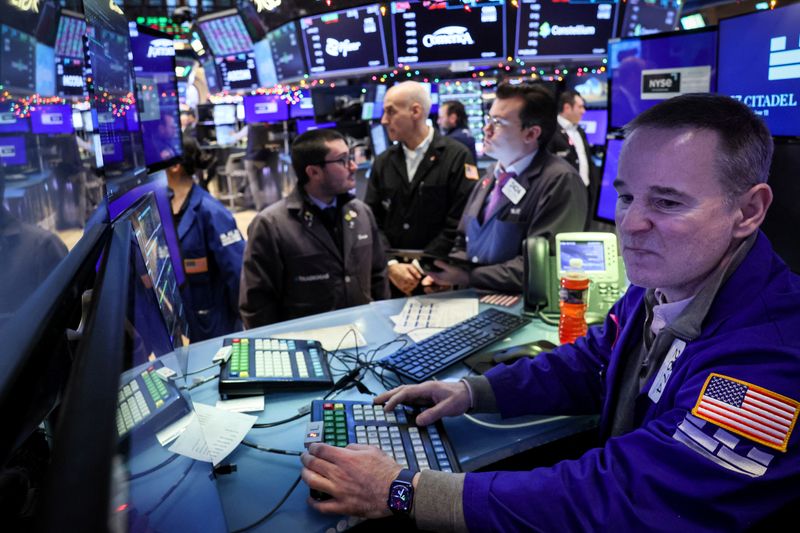(Reuters) - A look at the day ahead in U.S. and global markets from Mike Dolan
As Wall St waited optimistically for the Federal Reserve's latest nods and winks on future policy, Argentina took a hatchet to its peso while China's stocks resumed sliding after another underwhelming government economic plan.
As promised, Argentina's new government late Tuesday slashed government spending, cut whole departments and devalued the official peso exchange rate by more than 50% to 800 per dollar - though it still sits stronger than where informal and black market rates put the unit above 1,000.
The long-flagged moves from new President Javier Milei - in office just two days - aimed to cut across a spiral of debt and hyperinflation and were announced by his economy minister Luis Caputo. The International Monetary Fund welcomed the moves and Argentina's sovereign dollar bonds were marginally higher.
The drama in Buenos Aires was a distraction from Wednesday's main U.S. event, where Fed policymakers decide policy, publish their latest economic forecasts and Fed boss Jerome Powell speaks to the press.
No change is expected in the main rate of course, but markets will be keenly focused on Powell's emphasis and how much easing is included in policymakers' rate projections for next year - the so-called "dot plot".
The last update in September had one final hike left in 2023, which is now unlikely to materialise, and then two quarter point cuts from there by the end of next year. Most expect those two cuts to remain - but from current levels.
Futures markets, however, have more than 110 basis points of cuts still pencilled in for 2024 - though chances of a first cut as soon as March have slipped back below 50% since the slightly sticky November consumer price readout on Tuesday.
Although headline annual inflation rates fell back to 3.1% for the first time since June and core rates stayed at 4.0% as anticipated, higher rent components saw the monthly rate tick 0.1% higher.
Producer price inflation data due on Wednesday before the Fed decision should prove more benign - with core annual PPI expected to fall to just 2.2%, its lowest in almost three years and below rates recorded for most of the two years before the pandemic hit.
Underscoring the disinflation in input costs, U.S. crude oil prices fell again on Tuesday to their lowest since June - down almost 30% in just 10 weeks and clocking year-on-year declines still close to 10%.
All of which has stock and bond markets bulled up again into the Fed meeting.
Helping the tone was a well-received 30-year Treasury auction late Tuesday, healing wounds associated with a dire reception for the previous long bond sale in November.
A 12-year-high so-called pricing "tail" - where the highest yields at which the bonds are sold top pre-auction indications - disappeared once again.
At 4.28%, 30-year yields were almost 10 bp down from Monday's peak. The dollar was higher across the board, touching one-month highs against China's offshore yuan.
And Wall St stocks ploughed on - hitting new 20-month highs, up more than 13% in six weeks and less than 4% from all-time highs for the S&P500. Futures were higher again before Wednesday's bell.
Implied volatility continued to crater - dropping below 12 at one point for the first time since January 2020.
Overseas stocks were more mixed - higher in Europe ahead of the European Central Bank and Bank of England policy decisions on Tuesday, but lower in Asia where storm clouds continue to hover over China.
The blue-chip CSI 300 Index fell back 1.7% and Hong Kong's Hang Seng slipped 0.9% as investors were disappointed by the lack of specific property market supports in the government's latest economic stimulus plans.
China's Central Economic Work Conference will next year focus on efforts to spur domestic demand, state media said, but the lack of focus on the smouldering real estate bust is a concern for many.
In Britain, data showed the economy contracted more than forecast in October, raising the risk of a recession and testing the BoE's resolve to stick to its tough anti-inflation line.
And representatives from nearly 200 countries agreed at the COP28 climate summit on Wednesday to begin reducing global consumption of fossil fuels to avert the worst of climate change, a first-of-its-kind deal signalling the eventual end of the oil era.
Key developments that should provide more direction to U.S. markets later on Wednesday:
* Federal Reserve's Federal Open Market Committee decides policy and publishes latest quarterly economic projections; press conference from Fed Chair Jerome Powell

* U.S. Nov producer price index
* U.S. corporate earnings: Adobe (NASDAQ:ADBE), Nordson
(By Mike Dolan, editing by Mark Heinrich mike.dolan@thomsonreuters.com)